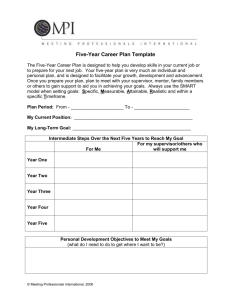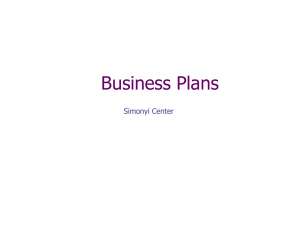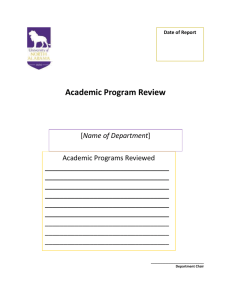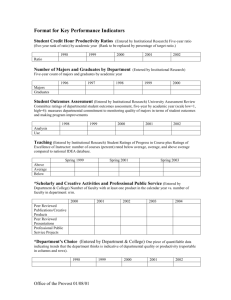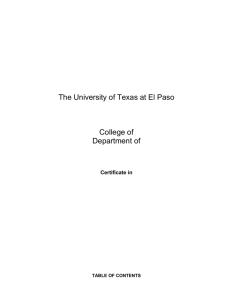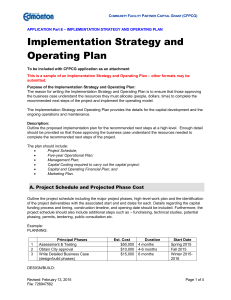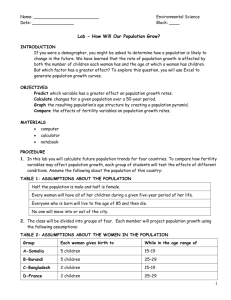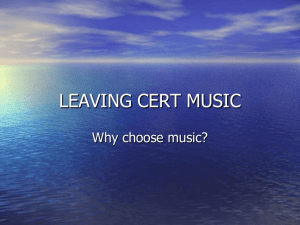Performance Music School - Edwards School of Business
advertisement
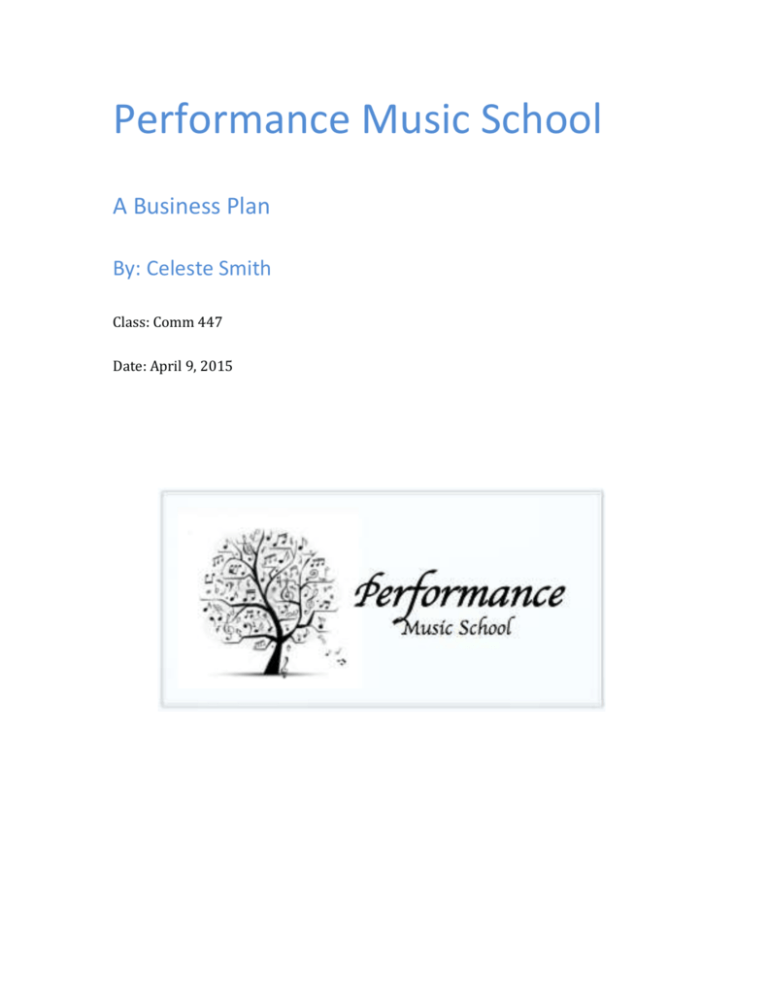
Performance Music School A Business Plan By: Celeste Smith Class: Comm 447 Date: April 9, 2015 Performance Music School Executive Summary Performance Music School is a one-stop-shop for music education in the old time and country music genres. It offers music lessons, instrument rental, and retail items for many different instruments. This music school will be located in the Stonebridge neighbourhood of Saskatoon, Saskatchewan, and will target school-aged children and senior citizens. I will be the head teacher and manager of the school. As the number of customers increases, I will hire an administrative assistant as well as seek out other music teachers that will act as independent contractors. Sales are expected to grow at forty percent per year due to word of mouth advertising, Kijiji, and posters in local schools, churches, and senior centres. Through personal experience teaching, I have found there to be a lack of fiddle teachers in particular, and a surplus of students, which is why I see this as a good opportunity. Because of this, not being able to find enough teachers is a potential risk. However, the business would still be profitable even if I were the only teacher at the school. The profits are expected to grow steadily for about five years, when the number of customers approaches the capacity limit. At that time, the business should be earning nearly $63,000 in net profit, which yields a total owner compensation of just over $96,000. This business offers a high return on investment, an acceptable owner’s salary, all with minimal risk. This would be a great business opportunity for someone, but I will not be pursuing it at this time because of undesirable working hours and my ability to find a secure, similar-paying job elsewhere. This business is definitely feasible and would be a good opportunity in the future. 1 Performance Music School Table of Contents 1.0 Introduction ..........................................................................................................4 1.1 Vision Statement................................................................................................................................................5 1.2 Mission Statement.............................................................................................................................................5 1.3 Company Values ................................................................................................................................................5 2.0 Operations Plan ....................................................................................................6 2.1 Location .................................................................................................................................................................6 2.2 Floor Plan .............................................................................................................................................................7 2.3 Hours of Operation ...........................................................................................................................................7 2.4 Business Structure ............................................................................................................................................8 2.5 Credit Policy ........................................................................................................................................................8 2.6 Supply Analysis ..................................................................................................................................................9 2.7 Capacity Limit .....................................................................................................................................................9 2.8 Margins and Cash Conversion Cycle ..........................................................................................................9 2.9 Planned Capital Budget ................................................................................................................................ 10 2.10 Operating Expenses .................................................................................................................................... 11 2.11 Working Capital............................................................................................................................................ 12 3.0 Human Resources Plan ........................................................................................ 13 3.1 Employees ......................................................................................................................................................... 13 3.2 Independent Contractors ............................................................................................................................ 14 3.3 Attracting and Retaining the Best Employees/Contractors ......................................................... 15 3.4 Five-Year Labour Cost Forecast ............................................................................................................... 16 3.5 Five-Year Benefits Cost Forecast ............................................................................................................. 16 3.6 Training Program Timing and Costs ...................................................................................................... 16 3.7 Average Business Day .................................................................................................................................. 17 4.0 Marketing Plan .................................................................................................... 18 4.1 Services and Products .................................................................................................................................. 18 4.2 Prices ................................................................................................................................................................... 18 4.3 Sales Projections ............................................................................................................................................. 19 4.4 Market Size........................................................................................................................................................ 20 4.5 Marketing Strategy ........................................................................................................................................ 20 4.6 Past Performance ........................................................................................................................................... 21 4.7 Competition ...................................................................................................................................................... 22 4.8 Customers.......................................................................................................................................................... 23 4.9 Target Markets ................................................................................................................................................ 23 4.10 Marketing Plan Budget .............................................................................................................................. 25 4.11 Revenue Projections ................................................................................................................................... 25 4.12 Customers Per Week .................................................................................................................................. 26 5.0 Financial Plan ...................................................................................................... 27 5.1 Five-Year Income Statement Projections ............................................................................................. 27 5.2 Five-Year Balance Sheet Projections ...................................................................................................... 27 5.3 Five-Year Cash Flow Statement Projections ....................................................................................... 27 2 Performance Music School 5.4 Planned Capital Spending ........................................................................................................................... 27 5.5 Financing ........................................................................................................................................................... 27 5.6 Depreciation ..................................................................................................................................................... 28 5.7 Dividend Policy ............................................................................................................................................... 28 5.8 Economic Forecast......................................................................................................................................... 28 5.9 Ratios................................................................................................................................................................... 29 5.10 Critical Variables .......................................................................................................................................... 29 5.11 Net Income and Cash Flow ...................................................................................................................... 30 5.12 NPV and IRR................................................................................................................................................... 30 5.13 Owner’s Compensation ............................................................................................................................. 31 5.14 Summary of Financial Results ................................................................................................................ 31 6.0 Summary ............................................................................................................ 33 6.1 The Opportunity ............................................................................................................................................. 33 6.2 The Customers................................................................................................................................................. 33 6.3 The Competitive Advantage ....................................................................................................................... 33 6.4 People Involved............................................................................................................................................... 33 6.5 Risk Analysis .................................................................................................................................................... 34 6.6 Feasibility – Worth the Risk?..................................................................................................................... 35 List of Tables ................................................................................................................ Figure 1: Building Exterior……………………………………………………………………………………6 Figure 2: Location……………………………………………………………………………………...…………6 Figure 3: Floor Plan……………………………………………………………………………………………...7 Figure 4: Initial Capital Budget……………………………………………………………………………10 Figure 5: Operating Expenses……………………………………………………………………………..11 Figure 6: Working Capital…………………………………………………………………………………...12 Figure 7: Five-Year Labour Cost Forecast…………………………………………………………….16 Figure 8: Five-Year Benefits Cost Forecast…………………………………………………………..16 Figure 9: Five-Year Sales Projections…………………………………………………………………..19 Figure 10: Five-Year Student and Revenue Growth……………………………………………...20 Figure 11: Marketing Budget………………………………………………………………………………25 Figure 12: Five-Year Revenue Stream Projections………………………………………………..26 Figure 13: Five-Year Projected Customers…………………………………………………………..26 Figure 14: Five-Year Capital Budget…………………………………………………………………….27 Figure 15: Five-Year Depreciation Forecast…………………………………………………………28 Figure 16: Five-Year Net Income and Cash Flow………………………………………………….30 Figure 17: Five-Year Owner’s Compensation……………………………………………………….31 Figure 18: Five-Year Summary of Financial Results……………………………………………..32 Appendix A: Financial Model ..................................................................................... 36 References ................................................................................................................ 37 3 Performance Music School 1.0 Introduction Performance Music School will be a one-stop music school for all ages, focusing on old time and traditional country music. Lessons will be offered for as many of the following as possible, depending on the availability of teachers and demand from students: fiddle/violin, piano, guitar, banjo, mandolin, double bass, voice, and songwriting, with the opportunity to expand into other avenues in the future. missjacobsmusic.blogspot.com; get-tuned.com; dreamatico.com; plantsvszombies.wikia.com; tech-kid.com; zzsounds.com Performance Music School will not only offer music lessons, but also everything else you need to learn how to play an instrument. This includes retail of a variety of music books, CD’s, instrument rentals/sales, and supplies such as strings, picks, music stands, and tuners. It will also offer in-house recitals twice per year as an added perk for students. In this genre of music in particular, students need the opportunity to play their music with other people, or “jam”. This music school will 4 Performance Music School help its students find other musicians and organizations to practice with in a group setting, and help prepare them for performance. 1.1 Vision Statement To make Saskatoon a musical city. 1.2 Mission Statement To teach music lessons to everyone to keep traditional music alive. 1.3 Company Values Education Enjoyment Encouragement 5 Performance Music School 2.0 Operations Plan 2.1 Location The planned location for the music school is 121-118 Cope Crescent in Saskatoon, Saskatchewan. This is a newer office building in the South end of Saskatoon. This particular office is 880 square feet, and is currently available for lease through Colliers Canada. The lease price is $25 per square foot, which will total $22,000 per year. This location was chosen for a few reasons. First, there is no music school business in the Stonebridge neighbourhood, yet many young families have moved there and there will likely be a school constructed there in the near future, which will help drive demand for a music school. Second, this particular office building is good because it is less expensive than many business locations because there is no street-front view. This music school doesn’t need to be seen from the street because it will not be catering to walk-ins, but instead will be serving scheduled students who will be procured through other avenues. Figure 1: Building Exterior Figure 2: Location http://www.collierscanada.com/13183#.VLLrH1oZ4sI https://www.google.ca/maps/place/Cope+Crescent,+Saskat oon,+SK+S7T/@52.0855652,106.6426249,17z/data=!3m1!4b1!4m2!3m1!1s0x5304f1020 76886c9:0x170cbac86a634489 6 Performance Music School 2.2 Floor Plan The diagram shown below is the proposed floor plan. There will be five individual teaching rooms to allow for five students at once. In the reception area there will be some chairs and a couple of coffee tables for clients to wait for their lessons, a desk for the administrative assistant, and a showroom for the retail items and instrument rentals. This room will have the ability to be transformed into a small recital room for events a few times per year. On the floor plan, there are also two lockable closets to store extra inventory and extra chairs for the recitals. There is no need for a washroom, as the building has one just down the hall. Figure 3: Floor Plan 2.3 Hours of Operation The hours of operation will really depend on lesson bookings. Because the retail part of the business is basically just for the school’s students, there won’t really be 7 Performance Music School any people coming to shop off the street, so it only needs to be open when there are lessons happening. The planned operating hours are as follows: Monday & Tuesday: Closed Wednesday, Thursday & Friday: 2:00 p.m. to 9:00 p.m. Saturday & Sunday: 10:00 a.m. to 9:00 p.m. Again, the above schedule could be changed depending on the availability of teachers and demand from students. During the time that no one is at the school, all phone calls would be forwarded to my cell phone so I could still take bookings and help clients at any time. The school will be closed for two weeks per year, one over Christmas and the other over the school break in February. In total, the school will be open fifty weeks per year. 2.4 Business Structure Performance Music School will be set up in the form of a corporation for a few reasons. The main reason is lower tax rates on profits of a corporation compared to an individual. Other reasons include the elimination of personal liability as well as the capability of the business to survive through potential changes in ownership. 2.5 Credit Policy In the music lesson industry, the accepted way of paying is either writing post-dated cheques for all lessons for the year, or paying for a whole month of lessons on the first lesson of the month. This is very beneficial for a start-up business in particular because the clients finance most of the required operating capital. Performance Music School will not offer credit except on potential instrument rent-to-own arrangements. 8 Performance Music School 2.6 Supply Analysis Performance Music School will have many different suppliers for its inventory and instruments, depending on exactly which instruments end up being taught. Below are many of the suppliers to be utilized: Michele Amy – music books Gordon Stobbe – music books Hal Leonard – music books Coast Music – instruments and accessories Music Distributors – instruments 2.7 Capacity Limit With the proposed schedule of five days per week and the hours outlined in “2.3 Hours of Operation”, the capacity limit would be 430 students (215 hours) per week. At $50/hour, the gross income from lessons only would be $10,750. The school will be open 50 weeks per year, yielding a total of 10,750 hours per year. 2.8 Margins and Cash Conversion Cycle For music lessons, the gross profit margin will be 25%, as that would be the fee to the independent contractors for using Performance Music School as their place of business. The cash conversion cycle on lessons would be an average of thirty days, because customers pay at the beginning of the month, and the teachers would be paid at the end of the month. On retail, the gross profit margin would be approximately 35%, based on cost and suggested retail from suppliers. The cash conversion cycle on this is estimated to be sixty days, as most of the inventory will be turned very quickly in September when most lessons begin, and minimal inventory will be held for the rest of the year. 9 Performance Music School 2.9 Planned Capital Budget The planned capital budget is shown in the table below. It estimates the costs of the required leasehold improvements, as well as factors in a contingency cost for unforeseen expenses. Additionally, it lists the equipment needed to start the business. The only capital items that will need to be purchased in the future are additional musical instruments for rental purposes, and this will depend on the number of students wishing to rent or purchase their instruments. Figure 4: Initial Capital Budget 10 Performance Music School 2.10 Operating Expenses The estimates of the ongoing operating expenses are listed in the table below. The figures listed are for Year 1. The accounting and legal cost is based off estimates from a professor and a local business owner. The breakdown of the advertising budget can be seen in Figure 11. Benefits are based on projected labour expenses, calculated on the minimum required amount of benefits in Canada. The phone, cell, and internet expense is based on current offerings from Telus and Shaw. A breakdown of the labour compensation cost can be seen in the Excel file in Appendix A. The building is 880 square feet; with a lease cost of $25 per square foot and occupancy of $10 per square foot, the total cost is $30,800. General supplies includes stationary, cleaning products, and other office needs. Repair and maintenance accounts for any expenses related to the damages and wear and tear to the school. Capital cost allowance is a result of depreciation of assets; the breakdown can be seen in Appendix A. Figure 5: Operating Expenses 11 Performance Music School 2.11 Working Capital I will personally contribute $30,000 to start this business. $24,150 will be put toward beginning capital costs (see Figure 4), $3,000 will be put towards inventory, and $500 will be held as accounts payable. The result is $8,350 in total working capital. Figure 6: Working Capital 12 Performance Music School 3.0 Human Resources Plan 3.1 Employees Performance Music School will begin by employing only one person: myself. Because the forecasted customers would require only slightly more than one fulltime employee, I will be able to take care of everything. However, by the third year, having grown significantly, the business would benefit from having a part-time administrative assistant/caretaker, at which point one will be hired. All other labour will come from independent contractors. While the music school is this size, I don’t anticipate needing any additional employees. Eventually if the school needs to be open more than seventy hours per week, I would consider hiring an additional administrative assistant and make the two of them part-time. I will personally train the administrative assistant(s). Manager/Head Teacher Job Description Coordinate all marketing activities Do all HR management Manage all contractors and employees Take phone calls outside of business hours Open and close the school Resolve any issues between students and teachers Approve bills and payments Oversee schedules Coordinate year-end/tax and financial work Evaluate teachers and their teaching styles Teach music lessons Full-time position Manager Skills and Abilities: 13 Performance Music School Teach music Bachelor of Commerce Degree in Management Organized Proactive Strong human resources/management skills Five years of teaching experience Administrative Assistant/Caretaker Job Description: Take phone calls and schedule appointments during business hours Clean the office Take payment for all retail and rental items as well as lessons Pay bills and contractors Open and close the school if the manager does not Part-time position Administrative Assistant/Caretaker Skills and Abilities: Customer service skills and experience Strong computer skills Organized Business training an asset 3.2 Independent Contractors Every music teacher will operate as an independent contractor. They will each get to define their own hours of work, and use their own teaching style as long as it is accepted by the manager and matches the students’ needs. They can also help decide how much to charge per lesson, as the price will depend on the teacher’s level of experience, education, qualifications, and demand. The music school will charge the teachers twenty-five percent of the lesson cost as a service fee for the venue, booking services and payment services. I will get as many teachers as 14 Performance Music School necessary to fill up the instruction rooms as much as possible. I anticipate that some of the teachers will be new to the profession, and therefore may need some training. I would offer training to new teachers to teach them effective ways of helping different people learn and as a test, have them teach myself and another person a lesson or two to evaluate their effectiveness. susiepeek.com 3.3 Attracting and Retaining the Best Employees/Contractors To attract a good administrative assistant, I will offer a good wage of $15/hour for the position, as well as allow for a flexible work schedule. This person will work full time, but since the school will be open slightly more than forty hours per week, likely many more in the future, I will allow this person to choose which days they want to work and I will personally take over the position for the hours they choose not to work. Attracting the best contractors will be a bigger challenge because the school will need many of them. One main reason for contractors to choose my school is because they take home more pay than at competitors’ places of business. Performance Music School will take 25% of its teachers’ income, whereas a leading competitor takes 33%. Second, there are no other music schools within a short distance of Stonebridge, so for teachers that live in and around that area, the location will be more convenient for them to come to. Third, the services the music school will provide to the contractors will make their experience hassle-free. The school will find students for the teachers, and will take care of all scheduling, billing, recitals, and maintenance of the teaching space. 15 Performance Music School 3.4 Five-Year Labour Cost Forecast The calculations for the below labour costs can be found in Appendix A. Both the manager’s salary and the administrative assistant’s wage increase by the inflation rate, while the administrative assistant’s hours also increase according to the number of students in the school. Figure 7: Five-Year Labour Cost Forecast 3.5 Five-Year Benefits Cost Forecast The cost of benefits is based on the applicable government required benefits (i.e. Canada Pension Plan and Employment Insurance). The rates are different between the manager and the administrative assistants, and the breakdowns can be seen in Appendix A. Figure 8: Five-Year Benefits Cost Forecast 3.6 Training Program Timing and Costs The manager will conduct training of the administrative assistant, and no external training will be required. Therefore there will be no additional costs to the salaries they are already being paid. The independent contractors will already have all the 16 Performance Music School necessary training, but a brief introduction and orientation will be conducted by the manager on the contractors’ own time. 3.7 Average Business Day On an average business day, either an administrative assistant or myself will open the school ten minutes before the first scheduled lesson. The students will purchase most of the required music books at the beginning of the year, but may buy more at various times of the year. The administrative assistant or myself will handle such sales, as well as answer the phone, organize schedules, and collect payments. Either the administrative assistant or I will do a quick cleanup and close the school when all of the lessons have been completed for the day. 17 Performance Music School 4.0 Marketing Plan 4.1 Services and Products Performance Music School’s main offering is traditional and country music lessons. This includes fiddle, guitar, piano, double bass, banjo, mandolin, voice, and songwriting. In the future, if there were both teachers and students for other instruments such as dobro or steel guitar, it would also branch into those areas. This business’ second area of focus is instrument rental. I expect approximately half of the students will not own their own instruments, but will instead choose to rent, so the music school will supply those instruments for rental. If a student wished to purchase one of the instruments, I would sell one to him/her as well for its value. The third line of offerings is retail music books and instrument supplies. The school will sell all music books required for lessons as well as additional ones that students may find interesting and voluntarily purchase. Instrument supplies include things like strings, picks, rosin, and shoulder straps; I will also sell small gifts and novelty items. interstatemusic.com; musicroom.com; amazon.com; fiddlebooks.com 4.2 Prices $25 per half-hour lesson, once per week 18 Performance Music School $30 per average music book $21 average rental per month Lessons will be booked in half-hour increments, and it will be mandatory that the students come for one lesson per week. If a student wishes to have hour-long lessons, they can book two lesson slots per week. Music books approximately range in price from $20 to $40, so the average book would cost $30. Instruments have a wide range of values, and the rental price would be calculated such that the cost of the instrument is realized in twelve months of rental. Based on the beginning inventory, the average instrument would rent for $21 per month. These prices are based on the industry standard, and as such are very comparable to competitors’ prices. I anticipate being able to charge the same price as I have indicated above plus inflation every year, but if I need to find more students, I would consider offering some kind of discount or “first lesson free” marketing strategy to get customers in the door. 4.3 Sales Projections For the first year, I have estimated to fill 40% of capacity, which equals 86 students. Approximately half of these students will rent instruments from the school, and each student will likely spend approximately $60 on retail items and books per year. Music lessons will account for around 87% of the revenue, rentals at 9%, and retail at 4%. The graph below shows the sales projections for the first five years. Figure 9: Five-Year Sales Projections 19 Performance Music School I have personally taught music lessons out of my home for five years, and have averaged a growth rate of 110% per year. This is likely not realistic for a brand new business of a much larger size than my current studio, so I have estimated the growth rate to be 40% per year until it reaches 80% of capacity. I anticipate that the studio will never reach 100% capacity as there are simply some hours of the day that music lessons would not fit into most people’s schedules. Figure 10: Five-Year Student and Revenue Growth 4.4 Market Size In 2011, Saskatoon had approximately 46,650 school-aged children and 31,533 seniors, for a total market size of 78,183 people (Statistics Canada, 2012). There are plenty of potential clients; the important part is reaching them effectively and convincing them to take music lessons at my school. 4.5 Marketing Strategy The most important part of my marketing strategy is word of mouth and referrals. I have many close connections in the traditional music industry, so with some e-mails and phone calls, the word would start to spread about my new music school. A few of my competitors (individuals, not businesses) do not have room to take on any new clients, and would be happy to send inquiries over to Performance Music School. 20 Performance Music School The second part of my marketing strategy is in relation to online presence. I will post advertisements on Kijiji because they are free and many people look there. I will also design my own simple website that will appear when potential customers search for music lessons in Saskatoon. To more closely target seniors, I will also list the school on SaskTel 411. The third part of my marketing strategy is to hang posters in places that my target market would be, such as schools, churches, and senior centres. By putting a poster in one third of the city’s facilities, about one hundred buildings would carry advertisements for the school. One competitive advantage of Performance Music School is convenience for the customer. Because most of the people teaching traditional old time and country music are individuals teaching out of their homes, they do not offer instrument rental or retail. At Performance Music School, customers can get the same quality of teaching, but with the convenience of only ever needing to go to one location. There has recently been many articles spreading across the internet arguing that music is very good for children’s development, encouraging parents to enroll their students in music lessons. This is a very good trend for the music school business, and I could use this as part of my promotion. 4.6 Past Performance I currently teach fiddle lessons out of my home, and have done so for five years. Out of fifteen students, every one has come for more than one year of lessons, with the exception of four that only started this year, but I anticipate will be coming back next year. Out of these fifteen, thirteen have been children, one is a senior, and one is a young adult. Over these five years, I have only lost two students, one because she pursued different activities instead, and one because he felt he had learned enough to go out on his own and just return for check-ins on occasion. Nine of my students found me through referrals and word of mouth while six saw my Kijiji 21 Performance Music School advertisement. None have had any problems with the pricing (currently $20 per lesson) and the revenue is all profit because my time is the only expense. 4.7 Competition My major competitors are listed below. Some are music schools while others are individuals teaching out of their home. Long & McQuade St. John’s Music 12 String Studios Saskatoon Academy of Music Custom Music Lessons MusicTeachersDirectory.org Everett Larson Kim de Laforest Anna Bekolay Based on speaking with people in the industry, most of the individual teachers are either fully booked to capacity or nearly full, and one of the major restraints for music schools is finding enough teachers to cater to the demand. Finding teachers will be a challenge for Performance Music School, but I will meet this challenge by offering teachers a higher percentage of lesson revenue than other schools as well as by using my network to inform potential teachers of the benefits of contracting to my school. One of the music schools tried to recruit me to teach there, but I was not anxious to give up thirty percent of the income when I thought I could teach out of my home instead. However, if I did not have a space at home to teach in and the school took a lower percentage, I would be far more likely to work at a music school and I think many other potential teachers would feel the same way. That is what Performance Music School is going to offer. 22 Performance Music School 4.8 Customers Most of the customers will be children, and their parents will pay for the products and services. Other customers will be seniors, as seen in section 4.9 Target Markets below. Customers will be signed into a contract agreeing to purchase one half-hour lesson per week for a year, and should they decide to break the contract, they will have to pay a penalty. Most customers will want their lessons after school and in the evenings, but seniors will likely want to come earlier on in the day. Customers will buy because Performance Music School will help musicians of all levels excel through education, enjoyment, and encouragement. We firmly believe that music should be fun, so the teachers will teach what the students want to learn. Factors influencing the customer’s decision to enroll in music lessons include instruments taught, available lesson times, teaching quality, and the school’s proximity to their home. 4.9 Target Markets The primary target market is school-aged children. This is the easiest market to enter because those are the people that typically begin taking music lessons, and parents encourage them to. Word of mouth is also more prominent for this age range because they have so many peers in school that they talk to about what they are doing, and word would quickly spread to other children’s parents. This market is also very attractive because these students are mostly at the beginning of their musical career, and so they are more likely to be long-term repeat customers. This market is the most attractive because of its size and potential for growth. famia.co.uk 23 Performance Music School The secondary target market is senior citizens. It would be a bit more difficult to target this market because they are less likely to use the internet to find out about the school, but word still travels quickly among seniors, so it is still a viable market worth targeting. Additionally, it will still cost very little to target this demographic. There is much potential in this market because often, music lessons are seen as something that children take; in reality, music lessons are perfect for seniors because they have more time to practice and are self-motivated. blog.kennedyviolins.com The third target market is music teachers; they are an integral part of the business. As mentioned under “competition”, I will attract them by offering above-industry compensation and a comfortable, low-stress work environment. Performance Music School will take care of all business-related items such as recruiting students, booking and billing. Not having to worry about administration would appeal to people with not very much experience in the industry, busy people, and ones that just want a low-stress job. Most of the music teachers I will target are university students and young adults who have lots of experience through playing music most of their lives. I will recruit these people through word of mouth, as well as by responding to their advertisements on Kijiji promising them students if they come to teach at Performance Music School. 24 Performance Music School 4.10 Marketing Plan Budget Below is a breakdown of the marketing budget for the first five years. Kijiji, word of mouth, and Facebook are free methods of advertising. The cost of posters was based on a quote from Staples and would be enough to hang posters in one third of Saskatoon’s churches and schools. I personally made a website last year for an unrelated project, and it cost approximately $300. I plan to make a similar website, but have added a $200 buffer in case of unforeseen expenses. The additional website costs in years two to five account for ongoing maintenance. Figure 11: Marketing Budget 4.11 Revenue Projections The revenue projections below are broken down into the three revenue streams: music lessons, instrument rental, and retail. All three of these are expected to grow at a rate of 40% per year until Year 6. Based on personal experience, I expect that half of the students will choose to rent an instrument in lieu of purchasing one. 25 Performance Music School Figure 12: Five-Year Revenue Stream Projections 4.12 Customers Per Week In the graph below, the horizontal line is the capacity limit, and the sloping line represents the number of customers in the base case. The capacity limit was calculated based on the hours of operation in section 2.3, five rooms in the studio, and each lesson being 30 minutes. The customers increase by 40% per year, and are expected to cap out in Year 6 at 85% capacity. The actual numbers can be seen in Appendix A. Figure 13: Five-Year Projected Customers 26 Performance Music School 5.0 Financial Plan 5.1 Five-Year Income Statement Projections See Appendix A. 5.2 Five-Year Balance Sheet Projections See Appendix A. 5.3 Five-Year Cash Flow Statement Projections See Appendix A. 5.4 Planned Capital Spending The schedule below shows the total capital spending for the first five years. I will be purchasing more instruments every year to accommodate the increased number of students that wish to rent instruments. Figure 14: Five-Year Capital Budget 5.5 Financing Performance Music School will require $24,150 in capital for the first year, as shown in the above capital schedule. I will contribute $30,000 of my own equity to fund this project. The nearly $6,000 extra will be used as a buffer in case of unforeseen expenses, and also for costs to be paid up front, such as the building lease. No debt is required for this venture. 27 Performance Music School 5.6 Depreciation Performance Music School will have two classes of assets to be depreciated. The first class is leasehold improvements (Class 13), and it will depreciate at a rate of four percent. The second class is furniture and fixtures (Class 8), including musical instruments, which will depreciate at a rate of twenty percent. Figure 15: Five-Year Depreciation Forecast 5.7 Dividend Policy The dividend policy is based on the amount of cash remaining at the end of the previous year. Ten thousand dollars will always be held in the account as a safety net; all additional cash will be paid out the following year in the form of dividends. 5.8 Economic Forecast There are many economic factors that come into play when forecasting financial aspects of a business. The expected inflation I have used in the forecasts is 2.5%, and I have used this figure to estimate the growth in expenses, wages, and product and service pricing. The projected growth in sales is based on both an increased number of customers and higher prices. I anticipate the number of clients will increase by 40% per year, based on my personal experiences in growth rates in my own studio. The prices are raised based on the inflation factor of 2.5%. 28 Performance Music School 5.9 Ratios Analyzing ratios are an important part of any business plan because they help in determining profitability and sensitivity, which help investors decide if it is something they want to invest in. Below is a list of key ratios for Performance Music School: Gross profit margin: Net profit margin: Key operating expenses as a percent of sales: Revenue growth: Cost per lesson: Overhead cost per lesson: 5.10 Critical Variables Performance Music School has two critical variables, one more important than the other. The most important variable is the number of teachers I can secure. People who want to be full time teachers and are able to find enough students typically teach out of their own home so they do not have to give up any income to a studio. This leaves me with using mostly part time teachers. These would likely have to be mainly university students, as people not in school usually have full time jobs and do not take on extra work outside of that. Even though there can be a lot of money in the music lesson world, people often choose a different career because working hours tend to be evenings and weekends, when people are available, and when someone has the option to make a good wage at a different job, they are likely to choose that instead. Because of these reasons, I do not anticipate having the same teachers for more than a few years, and they would mostly teach for less than twenty hours per week. However, if I can offer full time teachers a good wage with no hassle, I may be able to convince them to work at my studio instead of out of their home. The second critical variable is the number of students I can secure. I do 29 Performance Music School not see there being a lack of demand for the most part, but it is possible that eventually there might not be more students in the Stonebridge area to grow to capacity. 5.11 Net Income and Cash Flow The chart below shows that the projected net income and cash flow are very healthy, and are positive right from the beginning. They also increase at a good rate. The cash flow in Year 1 is high because of the extra “buffer” equity contributed at the beginning. It spikes down in Year 2 because the extra cash will be taken out in dividends. All of these contributors indicate that this is a feasible and profitable venture. The actual numbers can be seen under 5.14 Summary of Financial Results. Figure 16: Five-Year Net Income and Cash Flow 5.12 NPV and IRR For this type of business with such a small initial capital requirement, NPV and IRR are not the most accurate predictors of whether or not it is a good investment. Regardless, I have included these numbers for reference; they show that there 30 Performance Music School would be an extremely healthy return on investment. Recall that the equity investment is $30,000. NPV: $91,406 IRR: 104% 5.13 Owner’s Compensation In this type of business with such a small investment, a much more accurate measure of feasibility is the owner’s compensation. The table below shows the total owner’s compensation for the first five years. Beyond five years, the compensation is expected to grow marginally; the main growth would be from inflation only, as by the fifth year, Performance Music School will be near capacity. The average compensation over the first 5 years is $74,145. Figure 17: Five-Year Owner’s Compensation 5.14 Summary of Financial Results Figure 18 below shows the most important projections in the five-year forecast. More details and calculations can be seen in Appendix A. 31 Performance Music School Figure 18: Five-Year Summary of Financial Results 32 Performance Music School 6.0 Summary 6.1 The Opportunity I have seen a significant need for music lessons in Saskatoon, particularly of the old time fiddling, bluegrass, and country genres. This need has been apparent from my personal experience of increasing student numbers every year and recent inability to find replacement teachers. The inability to find teachers is concerning for Performance Music School, but on the other hand, if I can offer teachers enticing pay and convenience benefits, I will likely be able to secure new part time teachers. 6.2 The Customers The majority of the customers will be school-aged children, but their parents will be paying for the lessons, so it is important to target both groups of people. A smaller group of customers will be senior citizens. 6.3 The Competitive Advantage Performance Music School’s competitive advantage is the convenience it offers as well as the scarcity of the services offered. Scarcity in this context is referring to the limited availability of lessons in the old time and country music genres. 6.4 People Involved In this business’s infancy, I will likely be the only staff member required, or I may seek help from a very part-time administrative assistant and supplementary music teacher. As the business grows, the school will require many part-time or few full time music teachers and upwards of one full-time administrative assistant. 33 Performance Music School 6.5 Risk Analysis The main critical variable in this business is the number of contractual music teachers I can secure. Qualified individuals are fairly rare, and it may be difficult to get a good quantity and variety of teachers in order to match the amount of demand as well as provide the range of instruments that I would like to, especially for the rarer instruments such as mandolin and double bass. To manage this risk, I will focus much effort on recruitment and advertising for teachers. If I simply cannot get enough teachers, I will likely close the school and teach out of my home again, with no loss in the company. Figure 19 below shows the number of full-time or equivalent teachers required for each of the five years. I will count as one full time teacher, so the number of additional teachers required for each year will be the number less one. Figure 19: FTE Teachers Required The second variable is the number of customers, and I see this as being moderately critical. The first reason for this is that I see huge demand for these lessons all the time, indicated by the growth in my own studio. Secondly, the business will turn a profit even if I am the only teacher, so as long as I can get forty customers per year, the business will stay afloat. 34 Performance Music School 6.6 Feasibility – Worth the Risk? Using the base case projections, Performance Music School will turn a healthy profit and will offer good owner’s compensation every year in its existence. The return on investment is definitely acceptable, and the business is quite low risk because it is not very sensitive to the number of customers, and the number of customers is completely predictable from week to week. By taking all of these factors into account, I would say that opening this business is worth the risk. However, by teaching out of my home, I could earn approximately $100,000 per year with full time hours, or close to $80,000 with taking summer off, so I would choose to do that instead. Additionally, I realize that no matter where I teach, the majority of hours worked would be evenings and weekends, and I think I would choose to find a good, secure job with more standard hours instead. 35 Performance Music School Appendix A: Financial Model See attached Excel Spreadsheet. 36 Performance Music School Reference Statistics Canada. 2012. Focus on Geography Series, 2011 Census. Statistics Canada Catalogue no. 98-310-XWE2011004. Ottawa, Ontario. Analytical products, 2011 Census. Last updated October 24, 2012. 37
